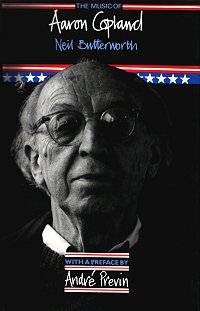 Neil
Butterworth has been Head of Music at Napier College in Edinburgh since 1968.
His Dictionary of American Composers was published in New York in 1984. His
love of Aaron Copland's music goes back many years. In fact he graduated
from Nottingham University with degrees in English and Music and an MA for
a thesis on Copland.
Neil
Butterworth has been Head of Music at Napier College in Edinburgh since 1968.
His Dictionary of American Composers was published in New York in 1984. His
love of Aaron Copland's music goes back many years. In fact he graduated
from Nottingham University with degrees in English and Music and an MA for
a thesis on Copland.
This new book forms a valuable addition to our knowledge about the composer.
Using over 160 musical examples, Butterworth analyses every one of the composer's
works from his early 'difficult' compositions, following his classes with
Nadia Boulanger in Paris, like the Dance and Organ Symphonies and the Piano
Concerto, though to his awakening and response to the musical demands of
the American public with a series of popular works like El Salon Mexico Rodeo,
Billy the Kid, Appalachian Spring, and the Clarinet Concerto; and finally
to his later forays into serialism with Connotations and Inscape.
André Previn, in his sharply-observed preface, reminds us that Copland
has become synonymous with American Music and "...endless film scores
attempting to depict certain 'outdoor' aspects of America - to be specific
the West and New England - steal blithely from those pages of Copland's
most famous scores which can be imitated but never actually duplicated."
Previn also reminds us that Copland's style - "the voicings of the chords
and the intervallic leaps in the melodic lines are unmistakeable"; and that
as a teacher (of both music and music appreciation) he had an enormous influence
..."no one has written on musical matters with more lucidity and strength."
This is a book aimed mainly at the professional musician, but the readable
style will appeal to the general music lover with limited technical knowledge
too for the author's analyses often contain much of interest besides the
actual musical examples. I was, however rather disconcerted about the chapter
on the Third Symphony where Butterworth digs deep into musical theory and
gets lost in the notes at the expense of a more general and human view of
the work. It is left to the last paragraph when Darius Milhaud is quoted
as having said: "His recent symphony has more grandeur and a deeper lyricism,
but the melancholy simplicity of its themes are a direct expression of his
own delicate sadness and sensitive heart." Readers might find a little more
insight by reading the interview with Copland on his Third Symphony published
in the notes for the 1979 CBS recording of the work with the Philharmonia
conducted by the composer.
I was disappointed, too, to see there was no discography a serious omission
and I felt the film music, apart from The Red Pony, was too briefly covered
(when will academics catch up with the rest of us and begin to appreciate
film music more?). Butterworth considers that The Heiress does not merit
a concert suite - I suggest that he listens to Slatkin's 1994 recording of
Arnold Freed's eight-minute suite of music from the film.
On the credit side there is much to admire: the in-depth coverage of the
opera The Tender Land, the absorbing section on Copland the writer and the
insight in the analysis of Copland's Style and Language. Butterworth identifies
Copland's economy of thematic material, his habitual use of the melodic interval
of a third, major and minor; themes built on arpeggios (that inevitably include
thirds); the more indirect influence of hymn tunes and folk tunes (often
the his melodies have a folk song flavour but they are nevertheless original;
in fact he has probably influenced American folk music more than it has
influenced him!); and the influence of jazz.
Butterworth also reminds us that despite occasional bitonality and the use
of serial techniques his harmonic language is basically diatonic.
Recommended.
Reviewer
Ian Lace

